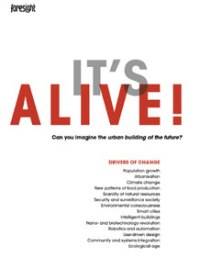February 19, 2013
Arup publishes its vision of the 2050 building
 Arup has published a new report called It’s Alive, which aims to describe how buildings in our cities could look and function in 2050. The study has been produced by Arup’s Foresight + Innovation team and predicts that “structures will be fully integrated into the fabric of the city, responsive to changes in the external environment, and designed for continuous adaptability, according to real-time needs and demands of its users.” The report includes a series of artist’s impressions, to illustrate how building features such as photovoltaic surfaces and algae-producing biofuel pods might enable buildings to produce food, energy and resources. More →
Arup has published a new report called It’s Alive, which aims to describe how buildings in our cities could look and function in 2050. The study has been produced by Arup’s Foresight + Innovation team and predicts that “structures will be fully integrated into the fabric of the city, responsive to changes in the external environment, and designed for continuous adaptability, according to real-time needs and demands of its users.” The report includes a series of artist’s impressions, to illustrate how building features such as photovoltaic surfaces and algae-producing biofuel pods might enable buildings to produce food, energy and resources. More →














 German cities dominate the investment prospects for Europe’s commercial real estate sector as investors favour safe havens according to a new report –
German cities dominate the investment prospects for Europe’s commercial real estate sector as investors favour safe havens according to a new report – 








February 11, 2013
Video: The 21st Century Office – how the BBC got it all wrong in 1969
by Mark Eltringham • Comment, Facilities management, Furniture, Technology, Workplace design
[embedplusvideo height=”200″ width=”230″ standard=”https://www.youtube.com/v/HnMjoitdRRM?fs=1″ vars=”ytid=HnMjoitdRRM&width=230&height=200&start=&stop=210&rs=w&hd=0&autoplay=0&react=1&chapters=&notes=” id=”ep8335″ /]
Two days ago we published a strikingly prescient report from Walter Cronkite dating from 1967 about how the world of work would look in the 21st century. Two years later the BBC was to get things hopelessly wrong, not only with its tired and misguided wannabe existentialism, but also with its vision of a future which was clearly just a slightly mechanised plasticky version of the present. That’s often the problem with futurology. It tells you more about the time in which people are making their predictions than any real vision of what is to come.